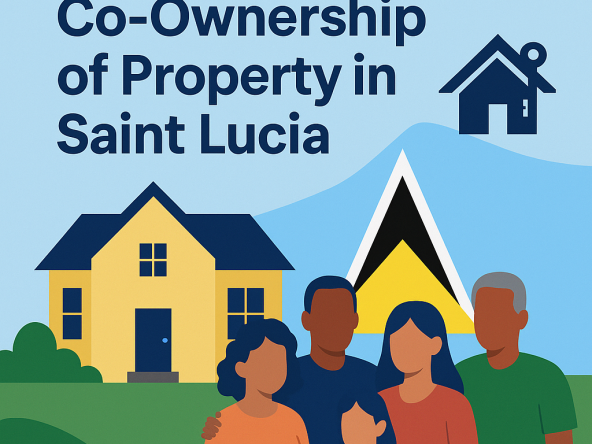Finally… Crown lands belong to the people
Saint Lucia’s Groundbreaking Crown Land Policy
The Government of Saint Lucia has proactively, finally (and long overdue) stepped-up by enacting ground-breaking law that will transform land ownership for hundreds of long-established residents on Crown lands. Under the new law, anyone who has been living on Crown land for at least 30 years legally and peacefully will be eligible for 8,000 square feet free of charge.
This resolution, which was moved and adopted in Parliament in July 2025, is one that defines the direction of Saint Lucia’s land reform policies in its post independence era. It acknowledges the generational nature of informal land-occupancy patterns in both the countryside and the city, and seeks to achieve long-overdue legal regularisation for hundreds — and possibly thousands — of families.
But what does it mean for the average Saint Lucian on the street? What does it mean for property values, real estate planning or our view of land tenure in the country?
Let’s dissect this momentous ruling and see what it means for people, for communities, and for the whole of Saint Lucia’s real estate market.
What the New Law Does: A Guide
The new law is targeted at Crown lands that have been openly occupied peacefully and without legal challenge for at least 30 years. These lands should not be under settled litigation and the claimants must show one of the two things that, (read occupation) either they holding or using the land in direct of their ownership terms (like cultivation or habitation).
Upon approval, eligible drivers will be eligible for a free grant of up to 8,000 square feet, which is a bit less than 1/5 of an acre (.18 acres). Occupants may have the right to buy such excess land at a reduced rate; if eligible, they would lose their rights if they do not purchase the land.
Crucially, to register, it is not just the period of the military rule that counts, it is also previous generations: the son or daughter or even grandchild of the original occupier may claim, provided he or she remains on a farm taken by a parent, grandparent, great-grandparent and so on during the era of military rule, and as long as this occupation chain can be proved and is unbroken.
Why This Is a Game-Changer
Saint Lucia, like many other Caribbean nations, has a long history of informal land tenure. From the eastern coast of Dennery to the hills of Morne du Don and the valleys of Choiseul, many families have lived for decades, sometimes for centuries, on land they do not own by legal title — for generations relying on their neighbors’ goodwill and their own word of mouth.
This mismatch has resulted in a number of problems:
-
Inability to obtain mortgages or loans due to not having title
-
Family conflict over ancestral lands between brothers and sons
-
Landowners vulnerable to eviction
-
Incompetence of government in planning for infrastructure and utilities
It is unlocking generational wealth for the countless families whose land is about to be titled because they’ve been living on it in good faith for 30 years or more, and titles will be issued in their names. Now titles can be used to obtain loans and inheritance rights and to engage more meaningfully in the economy.
The Human Impact: Real Stories, Real Change
The to line of this Tide’s poverty-as- personal-failing campaign may be “Seek help at church.”
Think about a fictitious case: a 67 years old woman named Maria from Anse Gert who has been living on her land since she was 11. Her father had built the original wooden home there, and through the years, she added to it to have one for her children. Through more than 50 years of living there, she never received a deed.
Under the new policy, Maria can now seek regularisation of her tenure, obtaining a legal title to the land she has always known as home. She might even be able to leverage that title to at last fix her aging roof or pass the land along in her will to her children.
Multiply Maria’s story by hundreds more across the island — from Ti Rocher to Ciceron, Babonneau to Saltibus — and the national impact is evident.
What to Know Before You Apply
Here’s what Saint Lucians can make of the new law:
1. Document Your Occupation
Continue The applicant must demonstrate some evidence of uninterrupted use. This could be:
-
Utility bills or receipts
-
Affidavits from neighbors or local officials under oath
-
Photographic evidence
-
Land survey or sketch (if on file)
-
Correspondence from civic officials or former land officers
2. Applications to the Department of Physical Development or Land Registry
The government will be establishing a formalized application system through land administrative services. The process will include application forms, site visits and verification processes.
3. Surveying and Boundaries
Proper land surveying will be needed to avoid disputes. You will probably have the DO lands and survey or a licensed private surveyor mark out and certify the 8,000 sq ft.
4. Free Title but With Rules
Recipients however will have to maintain the area and won’t be able to sell it for another individual’s soul. Titles could also carry restrictions that would ensure a property couldn’t be immediately resold or used for speculative development — the letter and intent of the policy.
Effects on Real Estate and Development
That policy has huge implications for the real estate and economic landscape in Saint Lucia:
-
Titling informal settlements gives confidence in the property market.
-
That’s positive for banks, which could get more mortgage demand from newly minted landowners.
-
Families are finally allowed to divide or build, as long as they have the necessary permits and their projects conform to zoning.
-
The historical squatter zones in which land speculation occurs may also be dampened as rightful occupants receive protection.
For builders, and for real estate investors, this is opening up new pockets of potential — from in-fill housing to small business development — in places where land rights have long been nebulous.
Critics and Challenges
No policy comes without criticism. Some contend the decision could create a temptation for fresh illegal occupation, for those seeking to cash in in future years. Some also worry that political favoritism will determine who ends up with titles first.
Land conflicts — particularly among extended families — may also grow as more people scramble to assert claims to traditional land tracts.
To prevent this, the government task of executing it must be open, evenhanded and unsluggish, with no chumminess and an appeal route for people whose claims are turned down.
One Step Toward Real Land Equity
For generations, Saint Lucians have lived on untitled land — often the same acre their grandparents cleared by hand and called home. This policy sea change represents a deep fissure in land justice, an acknowledgement that occupation is indeed a legitimate path to ownership — especially when it is backed by peaceful long-term residence.
It recognizes a historical truth: that many of our people have already “earned” the land that they live on, and that they have earned this not through purchase, but rather through care, cultivation, community.
Final Words – A groundwork for the future
And as this new law goes into effect, it is for communities, lawyers, surveyors and real estate agents to help, and to advocate for, those who can claim land. It’s also a time to consider what, exactly, ownership of land signifies — not as a matter of the law, but as a cultural and economic right.
Saint Lucia is not simply giving away land. We are righting a wrong that goes back a generation, and we’re putting the most powerful document that you will ever own in your hand, and that’s a title that says this land is yours.
If you, or someone you know has been in occupation of Crown land for at least 30 years then take up the offer. It’s always been your land — but soon, it may be yours on paper, too.
Stay updated: Subscribe to MichaLanders.com for additional news on this groundbreaking policy, including interviews, how-tos and downloadable application checklists




